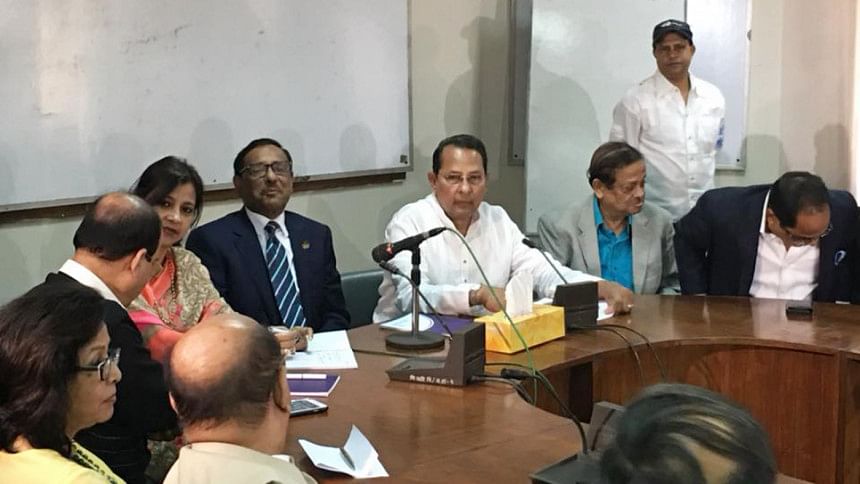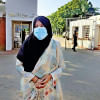No worries, it's not final

The road transport and bridges minister has urged the journalist community not to worry about the proposed Digital Security Act-2018, saying that all stakeholders would be consulted before getting it passed.
"Many [representatives of the media] had questions regarding the Digital Security Act and they had a wrong perception that the cabinet gave its final approval to the draft. The draft is now at the law ministry for vetting. And then it will be sent again to the cabinet," Obaidul Quader said yesterday.
"There is scope for discussions with the stakeholders. The door for discussions is open,” he said after a meeting with editors, journalist leaders and representatives of TV channels at Bangladesh Press Institute on Circuit House Road in the capital.
Information Minister Hasanul Haq Inu presided over the meeting attended by state minister for information Tarana Halim and Prime Minister's Media Affairs Adviser Iqbal Sobhan Chowdhury.
Meeting sources said a newspaper editor raised concerns about the draft Digital Security Act, especially its section 32, saying that they were frightened over the law.
Many of the participants supported him.
Obaidul Quader then told them not to be worried as the law had not been finalised.
Talking to reporters, Hasanul Haq Inu said the role of media in strengthening democracy had been discussed in the meeting.
According to section 32 of the proposed law, a person may face up to 14 years in jail or Tk 20 lakh in fine or both on charges of computer spying or digital spying if he or she illegally enters the offices of government, semi-government, autonomous or statutory bodies and collect or preserve or send any top secret or secret documents through a computer, digital device, computer network, digital network or any electronic form and help others to do that.
He or she will face imprisonment of up to a life sentence or Tk 1 crore in fines or both for committing the crimes for a second time.
On January 29, the cabinet approved the draft, triggering criticisms from journalists and rights defenders, who feared misuse of the law to curb people's right to expression.
The Shampadak Parishad and Newspapers Owners' Association of Bangladesh (Noab) has also been voicing concerns over the inclusion of the controversial Section-57 of the ICT Act and some other strict provisions in the draft Digital Security Act.
Terming the draft law a particularly harsh one, the Parishad, an organisation of editors of the country's national dailies, on February 6 demanded that the government drop all the controversial sections.
At yesterday's meeting, Quader said some differences of opinion had been created between the government and media.
The government wants to solve the issues and bring about a “healthy situation”, meeting sources said quoting Quader.
He also told the meeting that he considered media as a friend, not an enemy, and wanted to maintain a good relationship with it.
Quader, also general secretary of ruling Awami League, said his party expected “due coverage” in the news.
Quader also talked about the government's zero tolerance for corruption, mentioning that several ruling party leaders were either appearing in courts or in jail for corruption or misdeeds.
Citing examples, he said two ministers were regularly appearing before the Anti-Corruption Commission while a number of AL MPs were in jail. Besides, some Chhatra League leaders were awarded death penalty in the sensational Biswajit Das murder case.
A number of editors also spoke about a sudden fall in advertisements in their papers and other allegations of corruption in distributing government advertisements, the meeting sources added.
The meeting was attended by editors Golam Sarwar (Samakal), Matiur Rahman (Prothom Alo), Mahfuz Anam (The Daily Star), Moazzem Hossain (Financial Express), Imdadul Haq Milon (Kaler Kantho), Shyamal Dutta (Bhorer Kagoj) and Naimul Islam Khan (Amader Arthoniti); BSS Managing Director and Chief Editor Abul Kalam Azad, daily Jugantar's acting editor Saiful Islam, Ekattor TV Chief Editor and Managing Director Mozammel Babu, DBC News Editor-in-Chief Mohammad Manzurul Islam.
Besides, Independent TV owner Salman F Rahman, Daily Samakal publisher AK Azad, Maasranga Television owner Tapan Chowdhury, Channel i Managing Director Faridur Reza Sagor, BFUJ President Majurul Ahsan Bulbul and Secretary General Omar Faruk, Jatiya Press Club President Muhammad Shafiqur Rahman and General Secretary Farida Yasmin, columnist Syed Abul Maksud and Press Institute of Bangladesh Director General Shah Alamgir were, among others, present.

 For all latest news, follow The Daily Star's Google News channel.
For all latest news, follow The Daily Star's Google News channel. 








Comments